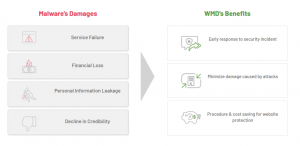- Some pages are for your eyes only!

Keep sensitive pages such as admin pages or testing pages off Google. If these pages are searchable on search engines, they become more vulnerable. Keep these sensitive pages off of the search engines. This can be done in several ways such as using “noindex” metatag, using a robots.txt file, etc.
- Secure your website with SSL certificate.

You might be thinking, “this is 2020. Who is not encrypting their website?” You may be surprised to find out only half of the most visited websites are redirected to HTTPS. Please secure your website with an SSL certificate. SSL certificates can be acquired for free on https://letsencrypt.org/ but for some, this step can be a hassle since it has to be continuously renewed. If you use AIONCLOUD’s WAF service, AIONCLOUD can also provide you our free SSL certificate with just a click of a button.
- Always remember to backup and backup your backup.

Okay, maybe you don’t need triple backup but I still stand by my point. With ransomware rampant on the web, you don’t want your data to be held as a hostage. Make sure you have a backup to ensure your valuable information and to provide continual service to your users. Give yourself a little reminder on a calendar and make a backup periodically.
- Get yourself a malware scanner.

Hackers are getting more sophisticated every day. Some malware is quietly planted in your server without your knowledge and stealing your clients’ information. This can damage your brand and cause catastrophic damage to your company. Get yourself a malware scanner. With AIONCLOUD you can get one starting from only $50 a month.
- Keep up with the updates.

You can be using various sites to host or create your website. You are probably using plug-ins for your site as well. Most of these (if not all) are updated periodically. These updates are made because the makers are aware of new security gaps and making patches for them. Keep up with the new updates and make sure you keep your website up to date on these new patches.


